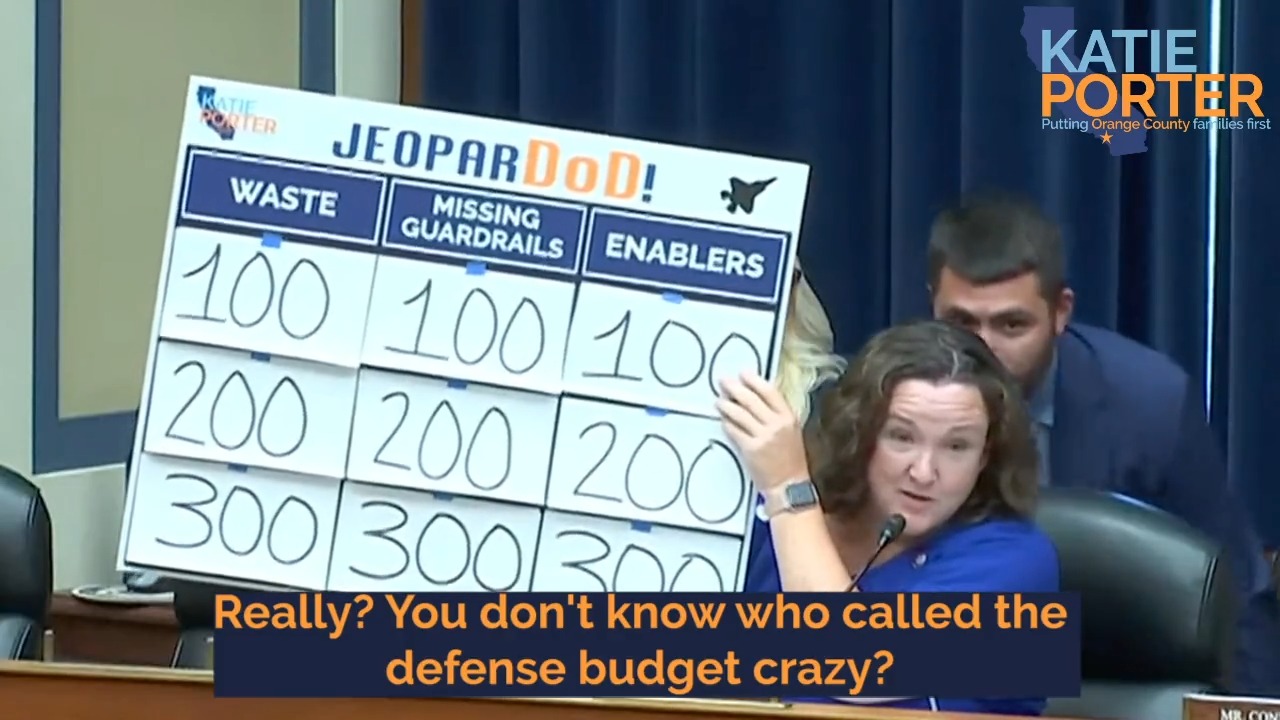Playing JeoparDoD! In the Pentagon
William Hartung / Inkstick Media
(July 17, 2023) — Congressional hearings on Pentagon spending aren’t always the most scintillating affairs. Talk of procurement policy, readiness, or acquisition reform can only attract the attention and interest of the most dedicated followers of defense policy, be they boosters or critics of the Pentagon.
Rep. Katie Porter (D-Calif.) changed that earlier this month when she engaged three government experts in a game of JeoparDoD!, a mock game show that asked them questions about various outrageous examples of Pentagon misspending and arms industry lobbying, Jeopardy-style. An article can’t fully do it justice, so make sure to watch the four-minute-plus video here.
As of this writing, Porter’s tweet with the video embedded had received 2.2 million views. It deserves to be seen by millions more.
Among the most amazing aspects of the interchange between Porter and the assembled budget experts was that the witnesses dutifully played along with the game. In the most entertaining moment of the hearing, one of them even corrected himself to phrase his answer as a question. Witnesses at the hearing — and participants in the game — included Brett A. Mansfield, Deputy Inspector General for Audits, Department of Defense; John M. Tenaglia, Principal Director, Defense Pricing and Contracting, Department of Defense; and Asif A. Khan, Director, Financial Management and Assurance, Government Accountability Office.
While the format was fun, the facts Porter was exposing were not. For the full list of questions, it’s well worth watching the video, but a few examples give a flavor of the proceedings:
“The President who called how much we spend on defense ‘crazy’ but let defense spending grow by $100 billion in one term.”
Answer: Who is Donald Trump?
“Ineffective DOD assets that cost about $600 million to build and are now being decommissioned before the end of their useful life.”
Answer: What are Littoral Combat Ships?
Some questions were easier than others:
“Individuals who get rich while pushing to overspend our tax dollars.”
Answer: Who are defense lobbyists?
Porter might have added as a footnote that the weapons industry employs over 800 lobbyists, well more than one for every member of Congress, as tallied by Open Secrets, a nonpartisan, independent nonprofit that traces money in US politics.
In addition, Sen. Elizabeth Warren (D-Mass.) has noted that the arms companies themselves are spending tens of billions of dollars buying back their own stock to pump up share values. They are also giving their CEOs compensation packages in excess of $20 million per year. These activities enrich contractors at the expense of taxpayers and the troops.
Porter had more questions — nine in all, including the following:
“A program that is $183 billion over budget and ten years behind schedule.”
Answer: What is the F-35?
Other questions focused on the Pentagon’s inability to pass an audit, account for more than half of its assets, or keep track of spare aircraft parts.
Porter’s compelling presentation is reinforced by a recent CBS 60 Minutes investigation that exposed rampant price gouging by Pentagon contractors.
In one of the most stunning examples, a former Pentagon procurement official held up an oil pressure switch that cost the National Aeronautics and Space Administration $328. The Pentagon paid $10,000 for the same item. And it’s not just parts. As 60 Minutes noted, “[t]he Pentagon, he told us, overpays for almost everything — for radar and missiles … helicopters … planes … submarines… down to the nuts and bolts.”
At a time when some in Congress are talking about seeking a supplemental request that would add to the enormous $886 billion already authorized for military spending for fiscal year 2024, the 60 Minutes investigation and Porter’s game are object lessons in why this would be both unnecessary and irresponsible.
If Congress wants to put money toward improving US defense capabilities, it should take steps to force reform in the Pentagon’s current dysfunctional budget process even as it stops compounding the problem by adding tens of billions in spending beyond what the department even asks for, mostly for pork barrel projects that are not aligned with any viable defense strategy.
Ultimately what is needed is a more realistic, restrained strategy that puts diplomacy above force and threats of force, relies on allies to do more in their own defense, and scales back dangerous and unnecessary initiatives like the Pentagon’s $2 trillion plan to build a new generation of nuclear weapons.
I outline just such an approach in a Quincy Institute paper issued earlier this year. But shifting strategy is a longer-term undertaking, and will ultimately require fresh thinking from the executive branch and the leadership of the armed forces in addition to prodding from key members of Congress.
In the meantime, Porter has convincingly shown that the Pentagon budget should not be sacrosanct, and can in fact be scaled back considerably without sacrificing actual defense capabilities.
William D. Hartung is a senior research fellow at the Quincy Institute for Responsible Statecraft.
Posted in accordance with Title 17, Section 107, US Code, for noncommercial, educational purposes.
